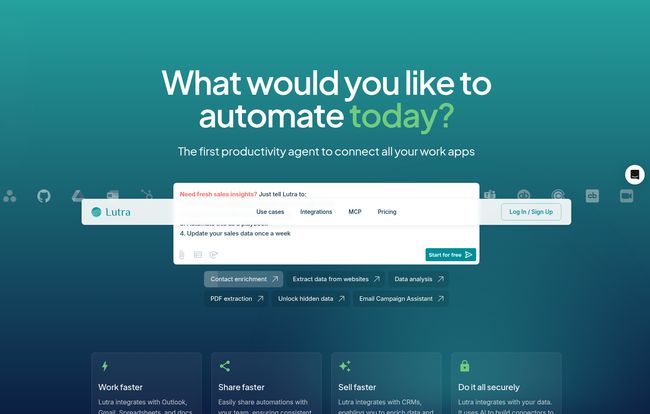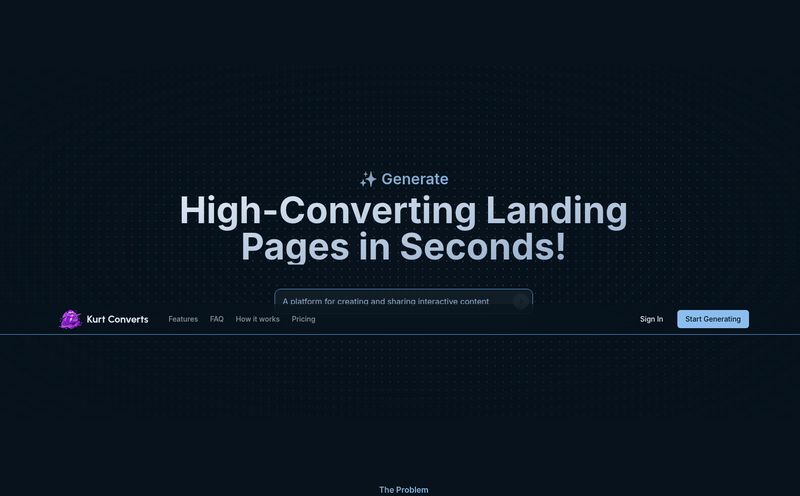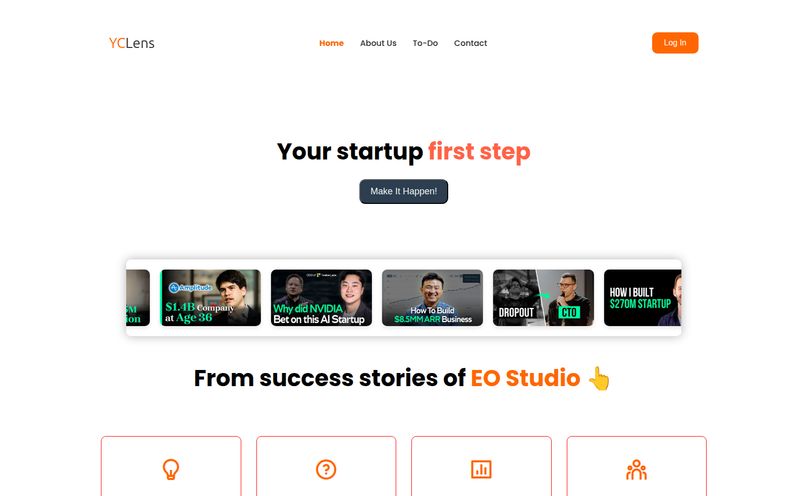If your browser tabs look anything like mine on a typical Tuesday, it’s a chaotic mosaic of SaaS tools that refuse to talk to each other. We've got our CRM over here, our email marketing platform over there, a project management tool in another corner, and about seventeen different spreadsheets holding it all together with digital hope and prayers. It's the modern knowledge worker's curse. The constant copy-pasting, the manual data entry... it's a grind.
For years, we've relied on tools like Zapier or Make to act as the digital duct tape. And they're great, don't get me wrong. I’ve built some seriously complex workflows with them. But they often feel a bit... rigid. You're stuck with predefined triggers and actions. If you need something slightly more custom, you either hire a developer or spend a weekend crying into a bowl of cereal.
So, when I first stumbled upon Lutra AI, my interest was piqued. It bills itself as a "productivity agent to connect all your work apps." Okay, cool. But the part that really grabbed me was the claim that it writes actual code to get your tasks done. This isn't just connecting A to B; it's like having a little AI intern you can boss around in plain English. Now that's a concept I can get behind.
So, What is Lutra AI, Really?
Think of Lutra AI less as a simple automation tool and more as an intelligent assistant that lives in your browser. You give it instructions, and it figures out the best way to use your connected apps to achieve the goal. It specializes in the stuff that eats up most of our time: enriching data for sales leads, doing research for a blog post, managing email campaigns, or even pulling specific info out of a PDF. It's designed to be a central hub for action.
The core difference I'm seeing here is the shift from "if this, then that" (IFTTT) logic to a more conversational, task-based approach. You're not building a static workflow; you're having a conversation with an AI that can execute multi-step tasks across different platforms. This feels like a step up, a move toward a more intuitive way of automating our digital lives.

Visit Lutra AI
The Lutra AI Features That Actually Move the Needle
A feature list is just a list until you see how it can save you from a headache. Lutra has a few capabilities that I think are genuinely useful for anyone in marketing, sales, or operations.
Taming the Data Beast with Enrichment and Research
If you're in sales or marketing, you know the pain of having a list of leads with missing information. Finding company size, industry, or the right contact person is mind-numbing work. Lutra's pre-built "Playbooks," like its LinkedIn Profile Enrichment tool, are designed to solve this exact problem. You can feed it a list of prospects, and it can go out and find the missing pieces of the puzzle, pulling from various sources and populating your CRM or spreadsheet. This is a massive timesaver. The same goes for content research; imagine telling it to "Find the latest stats on organic traffic conversion rates and summarize them in a Notion doc." Yes, please.
An AI-Powered Workflow Automation Engine
This is the heart of the platform. The ability to create custom workflows is where the real magic happens. Instead of just connecting two apps, Lutra can orchestrate a sequence. For example, you could create a flow that watches your inbox for new sign-ups, enriches their data using Apollo, adds them as a lead in HubSpot, and then sends a notification to a specific Slack channel. What's wild is that Lutra’s AI can build the connector to an API it hasn't seen before, which is a huge claim. In my experience, this usually means it works great for standard REST APIs but might need a little hand-holding for more obscure or poorly documented ones. Still, its a significant leap from the walled gardens of other platforms.
PDF Extraction and Email Assistance
Two other nice touches are its ability to extract data from PDFs and act as an email campaign assistant. Pulling structured data from invoices or reports stored as PDFs is a classic automation challenge, and having a tool for it built-in is smart. For email, it's not just about sending; it’s about using the data from your other connected apps to help draft personalized outreach at scale. It's all about making your tools work together instead of existing in their own little silos.
My Honest Take: The Good, The Bad, and The Complicated
Alright, no tool is perfect. After digging around, I've got some pretty clear thoughts on where Lutra shines and where you might hit a snag.
"The only AI addition I've found to my workflow that feels truly additive. Being able to combine all my work apps to respond to a single, simple prompt about a complicated email is magical." - Sam Isin, CEO at Aligned
On the plus side, the user experience is clearly designed for non-technical folks. The conversational interface makes complex automation feel much more approachable. The security is also a big win; being SOC2 certified means they take data privacy seriously, which is non-negotiable when you're hooking up your company's core applications. And the sheer potential of connecting any API is what gets me most excited.
However, there are a few things to keep in mind. The platform operates on a credit-based system for AI-intensive actions. This is pretty common in the AI space, but it does mean you need to monitor your usage to avoid unexpected costs. I’ve been burned by this with other AI tools, so it's something to watch. Also, while the AI can build custom integrations, I suspect that for truly unique or complex APIs, you'll still need a bit of technical know-how to guide it. Finally, like any integration platform, its uptime is dependent on the services it connects to. If Slack is down, your Slack automations are down. That's just the nature of teh beast.
How Much Does This AI Magic Cost? A Look at Lutra's Pricing
Pricing is always the million-dollar question, isn't it? Lutra has a tiered structure that seems pretty reasonable and in line with the market. They offer a generous free plan, which is more of a permanent trial than a time-gated demo.
| Plan | Price (Billed Annually) | Key Features | Best For |
|---|---|---|---|
| Free | $0 | 15 messages/day, 200 credits/month, Basic tool integrations. | Individuals wanting to test the platform and automate light tasks. |
| Essentials | $23 / month | Unlimited messages, 2,000 credits/month, Premium tools, Scheduling. | Professionals, freelancers, and small teams with regular automation needs. |
| Professional | $63 / month | 6,000 credits/month, Bulk credit purchase options, Priority support. | Power users, growing businesses, and teams running critical workflows. |
| Enterprise | Custom | Unlimited credits, custom integrations, dedicated support, custom security. | Large organizations with specific security, support, and integration requirements. |
The credit system is the main thing to understand here. You get a monthly allowance, and you can buy more on the Professional plan. AI actions and live data fetching will consume credits. During your trial on the free plan, you'll want to get a feel for how quickly you burn through those 200 credits to estimate your needs on a paid plan.
Is Lutra AI the Right Automation Tool for You?
So, who is this for? In my opinion, Lutra AI is a fantastic fit for sales development reps (SDRs), marketers, startup founders, and operations managers. Basically, anyone who feels like they're drowning in repetitive tasks that involve moving information between different web apps. If you've ever thought, "I wish my CRM could just automatically get the latest info from LinkedIn for this lead," then Lutra is speaking your language.
If you find traditional tools like Zapier a bit too rigid or intimidating, Lutra’s conversational approach could be the perfect entry point into serious workflow automation. It strikes a fascinating balance between user-friendliness and raw power.
Frequently Asked Questions about Lutra AI
How is Lutra AI different from Zapier or Make?
The main difference is the interface and intelligence. Zapier and Make use a visual, "if-this-then-that" builder where you define rigid triggers and actions. Lutra AI uses a conversational AI, allowing you to describe a task in natural language. It then writes the necessary code and orchestrates the actions across your apps, which can make it more flexible for complex, multi-step tasks.
Is Lutra AI secure for my business data?
Yes, security seems to be a priority. Lutra AI is SOC2 certified, which is a key industry standard for data security and privacy. It uses secure methods like OAuth to connect to your apps, meaning it doesn't store your passwords.
What are 'credits' in Lutra AI and how do they work?
Credits are used for more intensive operations, particularly those involving AI processing or fetching live data. Each paid plan comes with a monthly credit allowance. This is a pay-for-what-you-use model on top of the base subscription, so it's important to monitor your credit consumption, especially when you start.
Can I really connect any app that has an API?
That's the promise. Lutra's AI is designed to be able to build connectors to any standard API. For common apps, it's seamless. For more obscure or custom-built APIs, you might need to provide some guidance or have some basic understanding of how that API works, but it's far more powerful than being limited to a pre-set library of integrations.
Is there a free trial for Lutra AI?
Yes, Lutra offers a comprehensive "Free" plan that isn't time-limited. It includes 15 messages per day and 200 credits per month, making it a perfect way to thoroughly test the platform's capabilities before committing to a paid plan.
Final Thoughts on Lutra AI
Lutra AI is an ambitious and genuinely interesting take on workflow automation. It's not just another connector; it's an attempt to build a true AI assistant that can understand intent and execute complex tasks. It's not a magical solution that will solve every problem with zero effort, but it represents a significant step forward in making powerful automation accessible to everyone, not just those with technical skills.
If you're tired of the endless tab-switching and manual data shuffling, I'd say Lutra AI is absolutely worth a look. The free plan is generous enough to give you a real sense of its power. It just might be the AI-powered colleague you've been waiting for.



